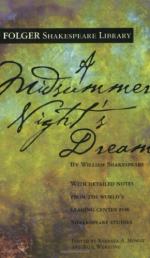|
This section contains 5,070 words (approx. 17 pages at 300 words per page) |

|
SOURCE: Pearson, D'Orsay W. “Male Sovereignty, Harmony and Irony in A Midsummer Night's Dream.” Upstart Crow 7 (1987): 24-35.
In the following essay, Pearson contends that in A Midsummer Night's Dream Shakespeare questioned the notion that male supremacy and feminine obedience lead to matrimonial harmony.
As is well known, the belief in the male's sovereignty in marriage and subsequently as head of his household had been hammered, figuratively, into the Elizabethan consciousness. The theory was divinely sanctioned. Children were governed by commandment; women in marrying were reminded, with the authority of St. Paul, that the husband was naturally fitted to be his “wyves heade, even as Christe is the heade of the church.”1 The official “Sermon on the State of Matrimony” described woman as the “weaker vessel,” not because of lack of physical stamina but because she was “a weak creature, not endued with like strength and constancy of mind...
|
This section contains 5,070 words (approx. 17 pages at 300 words per page) |

|


